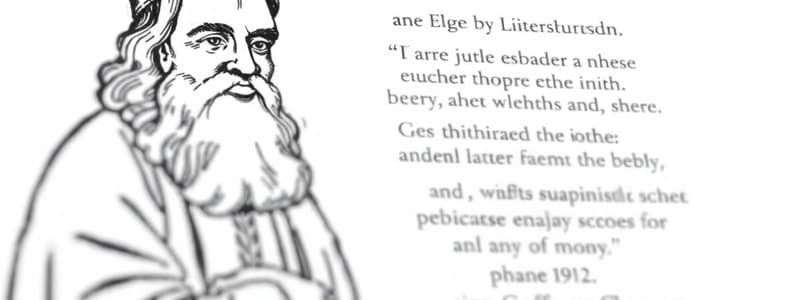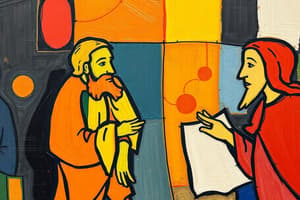Podcast
Questions and Answers
Who proposed the storytelling contest among the pilgrims at the Tabard Inn?
Who proposed the storytelling contest among the pilgrims at the Tabard Inn?
- Harry Bailly (correct)
- The Parson
- The Knight
- The Miller
Which tale is told by the Parson?
Which tale is told by the Parson?
- The Wife of Bath's Tale
- The Parson's Tale (correct)
- The Miller's Tale
- The Knight's Tale
What was Chaucer's original plan for the number of tales each pilgrim would tell?
What was Chaucer's original plan for the number of tales each pilgrim would tell?
- Three tales in total
- Two tales on the way to Canterbury and two on the way back (correct)
- One tale going and one coming back
- No predetermined number of tales
Which of the following groups is NOT represented among the pilgrims?
Which of the following groups is NOT represented among the pilgrims?
What significant contribution did John Wycliffe make to the English language?
What significant contribution did John Wycliffe make to the English language?
Which poet is known for the work 'Piers Plowman'?
Which poet is known for the work 'Piers Plowman'?
In which of the following tales does the character John the carpenter appear?
In which of the following tales does the character John the carpenter appear?
What is the primary theme of 'The Pardoner's Tale'?
What is the primary theme of 'The Pardoner's Tale'?
Which of the following works is attributed to Sir John Mandeville?
Which of the following works is attributed to Sir John Mandeville?
Which anonymous poet is referred to as the 'Gwain Poet'?
Which anonymous poet is referred to as the 'Gwain Poet'?
Who is regarded as the Father of English Literature?
Who is regarded as the Father of English Literature?
What type of poem is 'The Book of Duchess'?
What type of poem is 'The Book of Duchess'?
Which of the following poems did Chaucer write in Rime Royale stanza?
Which of the following poems did Chaucer write in Rime Royale stanza?
When was 'The Canterbury Tales' written?
When was 'The Canterbury Tales' written?
What structure does 'The Legend of Good Women' utilize?
What structure does 'The Legend of Good Women' utilize?
Which poem did Chaucer write inspired by classical poets such as Boccaccio and Virgil?
Which poem did Chaucer write inspired by classical poets such as Boccaccio and Virgil?
What is a key theme of 'The House of Fame'?
What is a key theme of 'The House of Fame'?
In what poetic form is 'The Canterbury Tales' primarily written?
In what poetic form is 'The Canterbury Tales' primarily written?
Which Duke is famous for being Chaucer’s patron?
Which Duke is famous for being Chaucer’s patron?
What is the primary inspiration behind 'The Book of Duchess'?
What is the primary inspiration behind 'The Book of Duchess'?
Flashcards are hidden until you start studying
Study Notes
Geoffrey Chaucer
- Born in 1340 in London.
- Known as the "Father of English Literature".
- Held various roles including page, courtier, civil servant, and clerk to the King.
- Patronized by John of Gaunt, Duke of Lancaster.
- Wrote "The Book of Duchess", an elegy mourning the death of Blanche, John of Gaunt's first wife.
- Died in 1400 and was buried in Westminster Abbey, later moved to "Poets' Corner".
- Introduced the heroic couplet in "The Legend of Good Women" and "The Canterbury Tales".
- Developed the "Rhyme Royale" stanza, consisting of 7 lines in iambic pentameter.
Chaucer's Works (Chronologically)
- The Book of Duchess (1369-1374): An elegy mourning the death of Blanche, Duchess of Lancaster. Written in dream allegory and inspired by "Roman de la Rose".
- The Legend of Good Women (1380s): A dream vision poem about the lives of 9 virtuous women from mythology and history.
- The House of Fame (1374-1385): A dream vision poem in 3 books, written in octosyllabic couplet. Inspired by classical poets like Boccaccio, Ovid, Virgil, and Dante. Themes include the power of poetry and the process of poetry creation. Remained unfinished.
- The Parliament of Fowls (1380s): A marriage song celebrating the marriage of King Richard II to Anne of Bohemia in 1382. Written in dream vision and in Rhyme Royale stanza.
- The Canterbury Tales (1387-1400): Chaucer's most important work. A collection of 24 stories totaling over 17,000 lines in heroic couplet.
- Narrated by a group of pilgrims on their way to Canterbury to visit the shrine of St. Thomas Beckett.
- The pilgrims gather at the Tabard Inn, hosted by Harry Bailly.
- Each pilgrim tells a tale, with the best storyteller winning free food and drink.
- The prologue introduces the pilgrims and their lives.
- The Parson's Tale concludes the work.
- Chaucer planned for each pilgrim to tell two tales on the journey to Canterbury and another two on the return journey, but the work remained unfinished.
- Represents a diverse range of social groups: nobility (Knight, Squire), Church (Nun, Nun's Priest, Parson), and commoners (Miller, Reeve, Manciple).
- Notable Tales include:
- The Knight's Tale (story of Arcite & Palamon)
- The Miller's Tale (fabliau of John the carpenter)
- The Wife of Bath's Tale (story of Alison)
- The Pardoner's Tale (tale about Death)
- The Friar's Tale (story of summoner)
- The Clerk's Tale (story of Griselda)
- The Nun's Priest's Tale (story of Cock and Fox)
- The Parson's Tale (seven deadly sins, in prose)
- Other Pilgrims' Tales:
- The Merchant's Tale (story of January & May)
- The Shipman's Tale
- The Prioress' Tale
- The Tale of Sir Thopas
- The Tale of Melibee
- The Monk's Tale
- The Nun's Priest's Tale (story of Cock and Fox)
- The Second Nun's Tale
- The Yeoman's Tale
- The Manciple's Tale
Other Major Authors of the Period
- John Wycliffe (1328-1384): Advocated for translating the Bible into the common vernacular. Translated the Vulgate Bible into Middle English, known as Wycliffe's Bible.
- John Gower (1330-1408): Wrote poems like "Confessio Amantis" (The Lover's Confession), "Vox Clamantis" (The Voice of One Crying Out), and "Speculum Meditantis" (Mirror of Meditation).
- William Langland (1332-1386): Known for writing "Piers Plowman", a dream allegory with religious themes. Full title: "The Visions of William Concerning Piers the Plowman". Nicknamed "The Morning Star of Reformation" for inspiring the Peasants' Revolt.
- Sir John Mandeville (1300-1371): Wrote "The Travels of Sir John Mandeville", a memoir written in French.
- Anonymous Poet (The Gawain Poet): Wrote the alliterative poem "Sir Gawain and the Green Knight" and other poems:
- The Pearl
- The Patience
- Cleanness (also known as Purity)
Studying That Suits You
Use AI to generate personalized quizzes and flashcards to suit your learning preferences.




